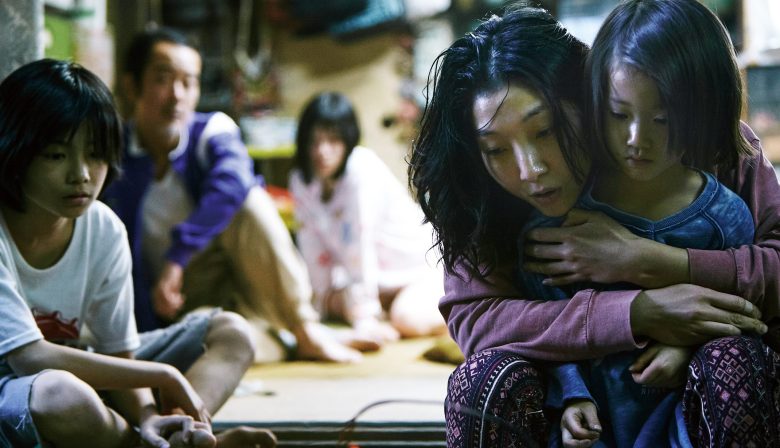ReviewShoplifters review
Peter Bradshaw The Guardian Hirokazu Kore-eda’s Shoplifters is a complex, subtle, mysterious film that builds to the most extraordinary surprise ending, a twist-reveal worthy of psychological suspense noir. Yet the film is nothing like that generically. In fact, it is another of the intricate and nuanced family dramas in the classical Japanese style, of which Kore-eda has made himself a modern master. Its significant plot shifts happen unobtrusively, almost invisibly, except for those big, heart-wrenching revelations in its final section. I admired Shoplifters very much the first time I saw it at the Cannes film festival earlier this year (it was the winner of the Palme d’Or), while also feeling that his masterpiece was still his 2011 film I Wish, which has a pellucid, almost transcendental simplicity that Shoplifters didn’t quite have. I Wish is still my favourite Kore-eda film, but, on a second viewing of Shoplifters for its UK release, I can see how the comparison was ungenerous. This is a brilliant and audacious film, one of his very best, a study of family trauma and fear of poverty, reviving themes from earlier films such as Nobody Knows (2004) and Like Father Like Son (2013). For all its calm gentleness, the film, which is based on a news story, is devastatingly clear-sighted about modern Japan, its dysfunctions and hypocrisies. Watching this, I found myself thinking of the Pink Floyd lyric: “Quiet desperation is the English way …” It’s the Japanese way as well. Lily Franky (from Like Father Like Son) plays Osamu, a man with a shifty, wheedling grin. He is effectively the Fagin-like head of an extended family of roguish people all nursing secrets and lies. This household appears to be a middle-aged husband and wife, a teen daughter (or perhaps younger sister to the wife?), a young son and a grandma – all living together in a cramped apartment rented from a suspect landlord who has to keep changing the names on his properties’ title deeds as part of his tax dodge of “flipping” notional ownership. Theoretically a casual labourer on construction sites, Osamu actually makes his money selling the things he steals on daily shoplifting expeditions with his boy, Shota (Kairi Jyo). His wife, Noboyu (Sakura Andô), works in a hotel laundry and she, too, steals things left in clothes’ pockets all the time. The younger woman is Aki (Mayu Matsuoka) who brings in her share of the family finances by taking part in a soft-porn peep show in town. Hatsue is the grandma, who supports this family with her pension and who also guilt-trips the grownup children of her late husband’s second wife into giving her money, which she mostly pours into pachinko slot machines. Hatsue is wonderfully played by veteran Japanese character actress Kirin Kiki. It was her last performance; she died in September this year. One day, coming home on a freezing night after a hard day stealing from supermarkets, Osamu and Shota come across a little girl of perhaps six or seven shivering in the cold. Impulsively, Osamu decides to take the poor homeless little waif in for a few days. She appears to have marks on her body consistent with abuse and she wets the bed: another classic sign. Osamu’s wicked old heart is evidently melted, and he says that they will keep this little girl, Juri (Miyu Sasaki), and train her up in the ways of shoplifting, which include making odd little hand gestures to your thief-partner to indicate when and what you intend to steal. And this despite the TV news broadcasts about this little girl having gone missing. But it is not just a question of Osamu finding redemption in doing good, nor is it a simple irony in Osamu’s crook-family fulfilling the function of the social services and the caring state – the state that would disapprove of and indeed prosecute Osamu if it knew what he was up to. The point is that Osamu has, in his amoral way, stolen Juri in just the same way as he steals everything else. And it isn’t the first time he’s done it. His ambiguously benevolent abduction of Juri is part of a larger pattern of concealment in which the whole family unit is involved. Nothing is what it seems. It is a movie made up of delicate brushstrokes: details, moments, looks and smiles. Shoplifters is the story of a group of frightened, damaged people who have made common cause with each other, banded together under the convenience flag of family, under the radar of the law, making the best of things from day to day, until they realise they have been making the worst of things. A rich, satisfying and deeply intelligent film. |
THURSDAY 9 MAY
Doors: 7.30pm Film: 8pm Shoplifters (15) The winner of this year’s top prize at Cannes, SHOPLIFTERS follows a small band of marginalised misfits struggling to make ends meet on the outskirts of Tokyo. Shoplifting to get by, they decide to secretly adopt a little girl they find foraging for scraps in the freezing cold – before an unforeseen incident begins to test their bond… It’s a welcome return by the renowned Japanese director, Kore-ada (Still Walking, Our Little Sister) who shines a spotlight on the struggling classes with his usual insight, compassion and humour. A triumph of subtlety over spectacle, Shoplifters is sure to steal your heart. Director: Hirokazu Koreeda
Writer: Hirokazu Koreeda Cinematographer: Ryûto Kondô Starring: Lily Franky, Sakura Andô, Kirin Kiki Running time: 120 mins. Other Reviews Rotten Tomatoes - 99% The Guardian - ★★★★★ Little White Lies - ★★★★ The Times - ★★★★★ The Independent - ★★★★ |














